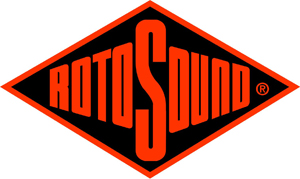Rotosound adds new nickel rounds to Swing Bass line
(Dave Molter | Posted 2011-05-10)

Boing! Rotosound has just added 45-100 gauge nickel strings to the Swing Bass line, whose stainless steel rounds were made popular by The Who’s John Entwhistle and Chris Squire of Yes.
Roundwound strings were developed by Rotosound at the behest of Entwhistle, who was looking for a brighter, more pianolike bass tone to complement his trebly and fleet fingered lead bass style. Those are Swing Bass steels you hear on the bass solo in The Who's "My Generation." Introduced in 1962, with widespread usage since the 1970’s, they changed the bass sound instantly, and have led the pack ever since.
Bass players insist on resilient, versatile and consistent strings, which give them the sound they want. The Swing Bass range offers 4 to 8 string sets in a wide range of gauges, made from either stainless steel or nickel, with a choice of double ball ends or not and even non standard lengths. All have the red silk ends making them instantly recognisable as Rotosound.
The new 45-100 gauge nickel strings give players a slightly more mellow, yet distinct, sound ( Product Code RS66LN ) and are manufactured to the same high specification as the Swing Bass Stainless Steel sets. The slightly muted, smoother tone, with the vintage vibe of the nickel plating, makes them a good alternative to the punchier sounding stainless steel. These strings are kinder to your fingers with their softer feel and give a warmer sound which develops the more you play them.
Árni Hjörvar the bass player of The Vaccines uses the RS66LN 45-100 Swing Bass Nickel strings to get his distinctive sound. The Vaccines were recently placed third in the BBC’s Sound of 2011 poll, and have been nominated for MTV’s ‘Best New Band of 2011’ award. BBC Radio 1’s Zane Lowe declared their demo single ‘If You Wanna’ released summer 2010 the ‘Hottest Record in the World’ and their first single ‘Wreckin’ Bar (Ra Ra RA)’ was Q Magazine’s ‘Track Of The Day’, following its release in November 2010.
All Rotosound strings are produced using a highly secretive, quality manufacturing process. Many are still made today the same as they were back in the 1960’s helping them retain their unique tone and sound, and Rotosound are passionate about keeping it that way. To find out more visit http://www.rotosound.com.
From a press release.



